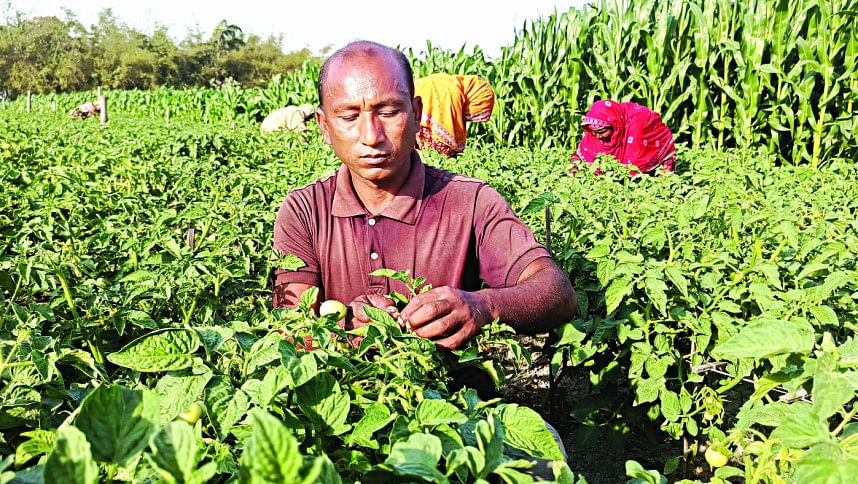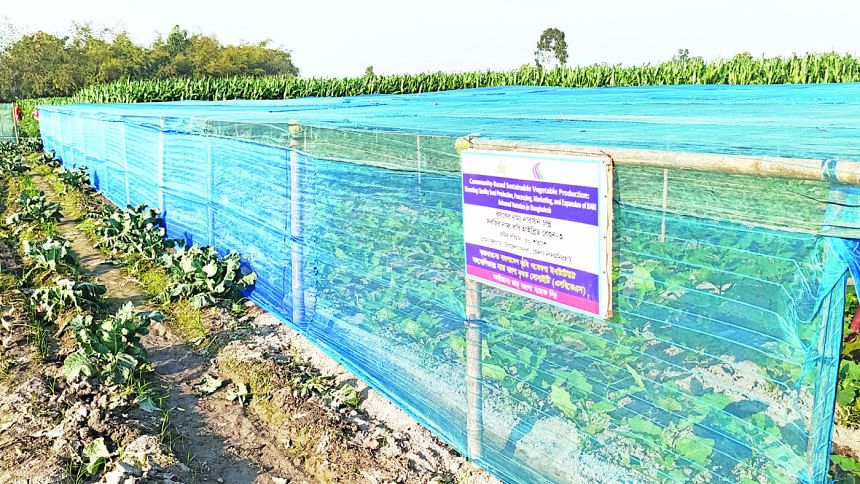Rangpur farmers see success in vegetable seed production

Over the past 15 years, farmers in Rangpur have transformed their agricultural practices by shifting from reliance on imported seeds to supplying homegrown ones across the greater northern region and other parts of the country.
Currently, around 1,200 farmers across 80 villages in five Rangpur districts produce more than ten varieties of vegetable seeds, including brinjal, tomato, cabbage, gourd, bean, bitter gourd and chillies.
They annually produce 50 tonnes of seeds on around 1,000 hectares of land, selling them to private firms for around Tk 500 crore.
Nearly 18 years ago, Lalmonirhat farmer Pishulal Roy, 68, began growing vegetable seeds on four to five decimals of land. He is recognised as the first vegetable seed producer in Lalmonirhat.
After cultivating seeds independently for two years, he came into contact with a representative from a seed company. With their support and guidance, he started commercial seed production.
Seeing his success and profitability, around 15-16 villagers became interested in seed cultivation. Roy says many farmers still seek his advice on seed production.

The Department of Agricultural Extension (DAE) says farmers in Lalmonirhat, Kurigram, Gaibandha, Rangpur and Nilphamari are not only profiting from seed production but also contributing to the country's overall vegetable supply.
"Rangpur's soil is well-suited for vegetable seed production," said Shafiqul Islam, additional director of the DAE in Rangpur.
However, seed production success depends on farming expertise, as Islam said only skilled farmers with technical knowledge can reliably grow seeds.
Narayan Chandra Roy, a 46-year-old farmer from Fulgachhi village in Lalmonirhat Sadar upazila, is one such grower. For him, seed cultivation requires constant monitoring and meticulous care.
Roy has been producing seeds for 15 years, and now he earns around Tk 10-12 lakh per year by selling directly to seed companies.
Alongside 15 others in his village, he grows seeds for brinjal, tomato, cabbage, gourd, and other varieties.
The farmer said the production hovers around 4-12 kgs per bigha, depending on the crop.
"Sixty to sixty-five percent of my income covers labour costs, but I still net Tk 3-4 lakh yearly," Roy told The Daily Star. "The companies buy directly, so we face no hassle in sales."
In the 2023-24 season, the country's vegetable seed demand was 3,060 tonnes, 85 percent of which was met by government supplies. Private firms sourced the rest from farmers like Atul Chandra Roy of Durakuti village.
Roy, 44, has been growing seeds for 14 years. He said companies pay between Tk 3,000 and Tk 24,000 per kilogramme, depending on the variety.
"This work has brought us prosperity," Roy told The Daily Star. "My whole family helps, though it requires patience. After expenses, I earn over Tk 3 lakh per year from my 4-5 bighas of land."
From Rajarhat upazila of Kurigram, seed grower Akter Hossain said production requires slightly elevated land and protective cover in winter.
The 55-year-old farmer, who has been into seed cultivation for around a decade, said, "We are seeing real economic gains."
According to DAE official Shafiqul Islam, while southern Bangladesh doesn't produce vegetable seeds, Rangpur now supplies the entire country. "It is a sharp contrast to 15 years ago, when imported seeds used to dominate vegetable farming in the northern region."
"Only aware, skilled farmers succeed in this," he said. "But where conditions are right, and with our technical support, they are thriving."

 For all latest news, follow The Daily Star's Google News channel.
For all latest news, follow The Daily Star's Google News channel. 



Comments